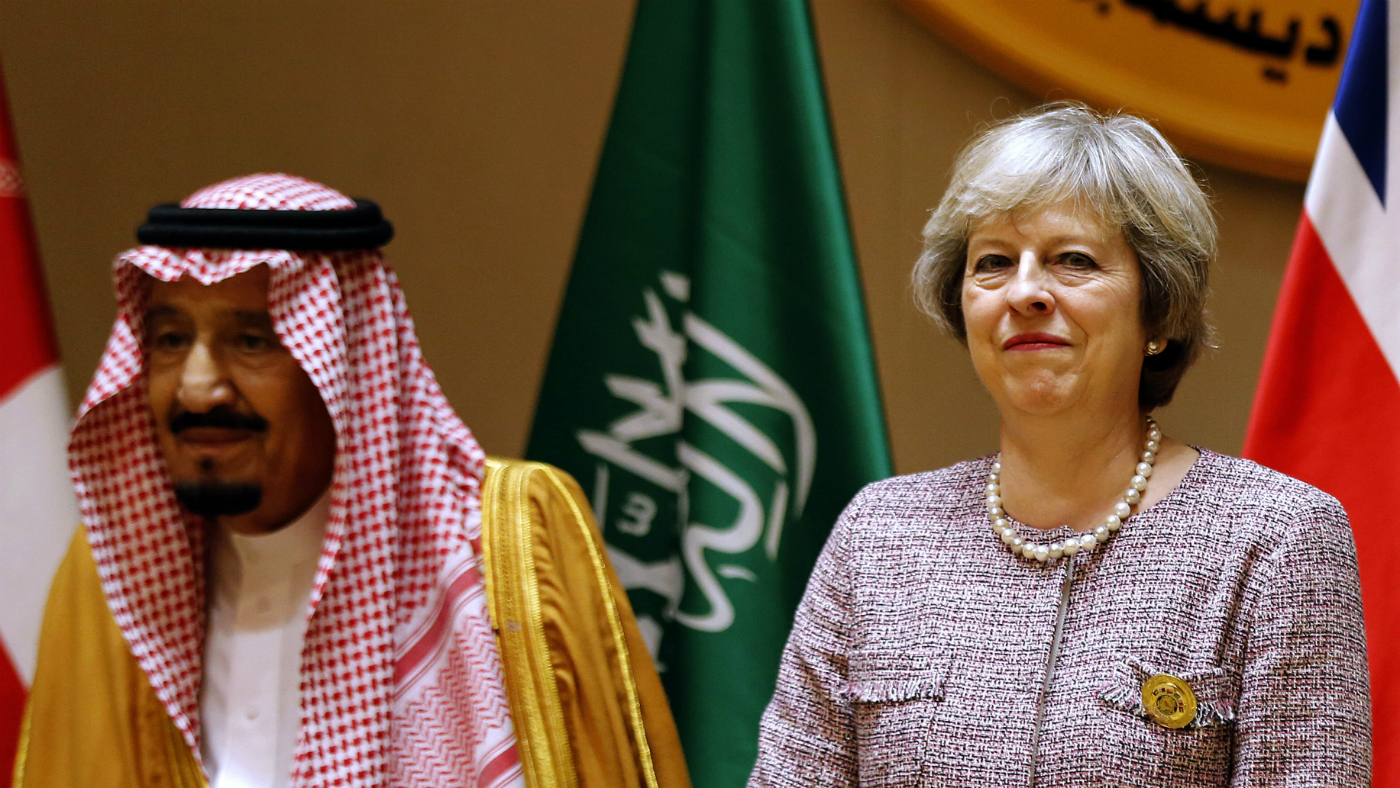May's Saudi trip highlights tension between trade deals and principles
PM defends talks as being in the 'national interest', but critics say they are a sign of 'how low the government will stoop'

A free daily email with the biggest news stories of the day – and the best features from TheWeek.com
You are now subscribed
Your newsletter sign-up was successful
Theresa May has been forced to defend the UK's relationship with authoritarian regimes amid growing unease that human rights concerns are being overlooked in the hunt for post-Brexit trade deals.
Speaking in Jordan during her three-day visit to the Middle East, which ends today in Saudi Arabia, the Prime Minister defended her drive to strike new links with countries with questionable human rights records.
She denied Britain was "selling its soul" by trading arms to Riyadh, which has been accused of carrying out war crimes in Yemen, and stressed the importance of business deals to protect the country.
The Week
Escape your echo chamber. Get the facts behind the news, plus analysis from multiple perspectives.

Sign up for The Week's Free Newsletters
From our morning news briefing to a weekly Good News Newsletter, get the best of The Week delivered directly to your inbox.
From our morning news briefing to a weekly Good News Newsletter, get the best of The Week delivered directly to your inbox.
"It's in our national interest to ensure we're working with others around the world to maintain our safety and security - and yes, it's in our national interests to ensure that the values that underpin us as Britons are values that we promote around the world," she said.
Britain's relationship with the Gulf states has proved awkward for previous leaders, "but now the continuing famine in Yemen, and civilian casualties from the Saudi-led - and UK-backed - blockade and attacks on rebel forces there have only raised the pitch of the controversy", says the BBC's John Pienaar.
Simon Tisdall in The Guardian says the Prime Minister's argument that it is better to engage with unsavoury foreign governments than "stand on the sidelines, sniping" has been made by politicians since the days of apartheid.
He adds: "May hopes her fresh-minted Global Britain will create a new paradigm in international trade. The danger is it may also set a new standard for global hypocrisy that boosts repressive regimes everywhere."
A free daily email with the biggest news stories of the day – and the best features from TheWeek.com
In The Independent, Andrew Smith says that three months after May called for Brexit to usher in the era of a "truly global Britain", we're starting to see "what that actually means".
Over the past six months, the Prime Minister and other Cabinet members have been on a "whistle-stop tour of authoritarian regimes", including Turkey, Oman, Bahrain, UAE, Jordan, Egypt and Saudi Arabia.
International Trade Secretary Liam Fox touched down in the Philippines yesterday to launch a charm offensive on President Rodrigo Duterte – a man nicknamed "the Punisher" whose widely condemned war on drugs has resulted in more than 7,000 extrajudicial killings.
Fox's praise for the "shared values and shared interests" of the UK and the Philippines has drawn widespread criticism.
Labour MP Harriet Harman said: "There is a real danger that in our desperation to conclude trade deals respect for human rights, which is in every EU contract, will just go out of the window."
Lib Dem foreign affairs spokesman Tom Brake called Duterte "one of the 21st century's most sinister leaders" and said the trip shows "just how low this government is willing to stoop in order to secure even a minimal trade deal in the future".
Similar concerns were expressed by members of the foreign affairs select committee when Foreign Secretary Boris Johnson visited Turkey to investigate bilateral relations, with MPs warning the country risked being seen as dropping its human rights worries for a better strategic relationship with Ankara.
-
 The environmental cost of GLP-1s
The environmental cost of GLP-1sThe explainer Producing the drugs is a dirty process
-
 Greenland’s capital becomes ground zero for the country’s diplomatic straits
Greenland’s capital becomes ground zero for the country’s diplomatic straitsIN THE SPOTLIGHT A flurry of new consular activity in Nuuk shows how important Greenland has become to Europeans’ anxiety about American imperialism
-
 ‘This is something that happens all too often’
‘This is something that happens all too often’Instant Opinion Opinion, comment and editorials of the day